[Note: this piece deals solely with the 1994 movie Street Fighter and does not take into consideration any of the back-story or mythology presented in the video game series. Sorry video game peeps. But if you want to debate the finer points of SF:IV’s effects on diplomacy vis a vis SF:II, take it away in the comments!]
Most people remember the 1994 movie Street Fighter as just another failed attempt to bring a popular video game to the big screen. The characters from a free-for-all fighting game don’t translate well to dramatic narrative, and the plot feels flimsily applied to the string of action/fight sequences, much like in an actual video game. Need a reminder of this?
It’s probably better than the 3.3 rating it gets on IMDB, but not by much. It’s one of those movies that has an awkward relationship with the campy nature of its source material (see also: Clash of the Titans, 2010 remake. Actually, no, don’t see it. It was terrible); you’re never quite sure if you’re laughing “with it” or “at it.”
All of that aside, though, Street Fighter is actually a fascinating cultural artifact from the period of international uncertainty following the end of the Cold War. In fact, it neatly encapsulates the central struggle of American foreign policy over the last two decades–the competing desires of multilateralism and unilateralism–and it encapsulates such a duality in the form of this man:
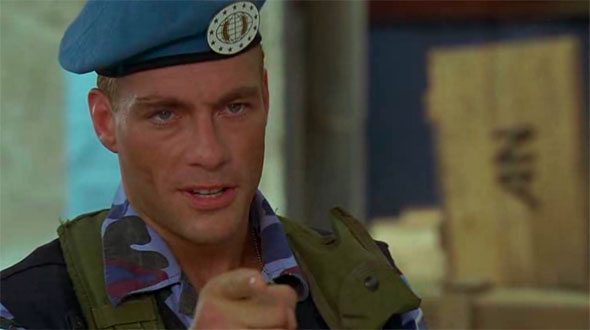
First, a little background. There’s not a whole lot you need to know, but the salient points are thus:
There’s a civil war in the fictional Southeast Asian country of “Shadaloo.” It’s a stand-in for Cambodia, Myanmar (Burma), or Thailand, as indicated by its place on the map and the faux-Thai script:
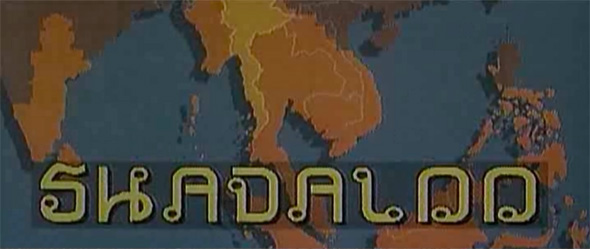
"Shadaloo" is a portmanteau of "Shadow" and _____?
An international fighting force from the “Allied Nations” is on the ground. Their blue helmets are clearly meant to signify the United Nations:
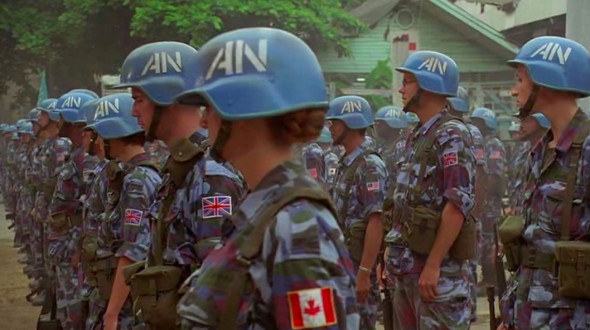
Notice that everyone still wears their national flag on their sleeve. More on that later.
They secured the capital, Shadaloo City, and are trying to rescue international aid workers who’ve been kidnapped by warlord M. Bison. They represent a variety of countries, but most notably, the good ‘ol U.S. of A. as embodied by the perplexingly accented Col. Guile:
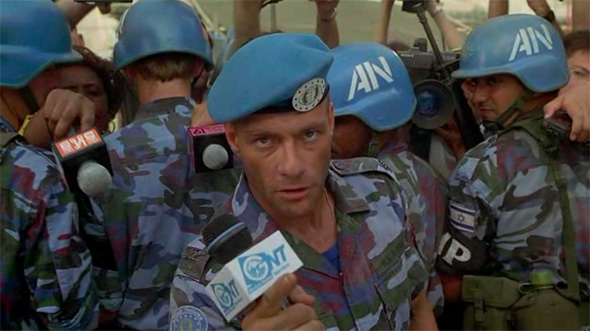
He's got something to say to M. Bison...and to all of us.
So these are the good guys, right? Well, yes and no. As we’ll see later, Street Fighter has a tricky relationship with the idea of multilateral action. But before we get too far into the foreign policy dynamics of this movie, let’s first remind ourselves of the state of world affairs in 1994.
In early 1991, the USA led an international coalition on a UN-backed mission to oust Saddam Husein’s Iraqi forces from Kuwait. Multilateral internationalism seems to win the day, but as the years pass following the end of the war, the international community seems unable to fully contain Iraq’s belligerent actions and weapons programs.
In late 1991, the Soviet Union collapsed and left a tremendous power vacuum in its wake. With the United States as the world’s only remaining superpower, many hoped that a new united internationalism would replace the old hegemonic power structures and act as a force for good throughout the world, much as it had seemingly done in the aforementioned Gulf War.
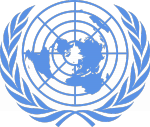 But some had their doubts. As peacekeeping forces fanned out across the globe into uneasy roles in places like the former Yugoslavia and Somalia, the world started to get uncomfortable with this notion of international policing. Americans critics feared that troops would be unnecessarily dragged into conflicts without doing anything to actually help the situation. Their criticisms were not entirely unfounded. As this New York Times article from September 1992 reports:
But some had their doubts. As peacekeeping forces fanned out across the globe into uneasy roles in places like the former Yugoslavia and Somalia, the world started to get uncomfortable with this notion of international policing. Americans critics feared that troops would be unnecessarily dragged into conflicts without doing anything to actually help the situation. Their criticisms were not entirely unfounded. As this New York Times article from September 1992 reports:
The United Nations finds itself being criticized for some of its peacekeeping operations, traditionally the most visible and successful of its activities. After notable successes in Central America, Namibia and most recently Cambodia, the United Nations has failed to prevent Bosnia, a member state, from being dismembered by force…
…In Somalia, controversy surrounds the United Nations’ efforts to impose order on Mogadishu as casualties mount and the national contingents of peacekeepers bicker.
Even the UN itself wasn’t confident it was up to its new role:
The international climate may seem more favorable to global governance than at any time in the past half century, but the United Nations is not yet looking like the world authority it hopes to be. In Bosnia, Somalia, Angola and other places, it seems in danger of falling down on the job.
Disillusionment has been building all summer. Secretary General Boutros Boutros-Ghali has warned repeatedly that the organization is being asked to take on more than it can handle.
“Our renaissance remains in question,” he said in a recent interview. “Demands made upon the United Nations are not being matched by resources to do the job.”
Given this background, it seems strange that the makers of Street Fighter would put their heroes under the UN/AN flag. These are supposed to be the good guys who save the day, not ineffectual peacekeepers and pawns of international diplomatic stalemate, right?
But it make sense for two reasons. The first is simple movie economics; an international fighting force is more appealing to an international movie audience (see also: G.I. Joe: The Rise of Cobra. Actually, no, don’t see that one either). But the second is more important and central to the story: the weak will of the international community threatens to sabotage Col. Guile’s mission.
In this pivotal scene, the wormy, quasi-European bureaucrat informs Col. Guile that the “Security Council” (they didn’t even try to disguise its name!) has voted to negotiate with M. Bison and pay his ransom. Guile is not pleased:
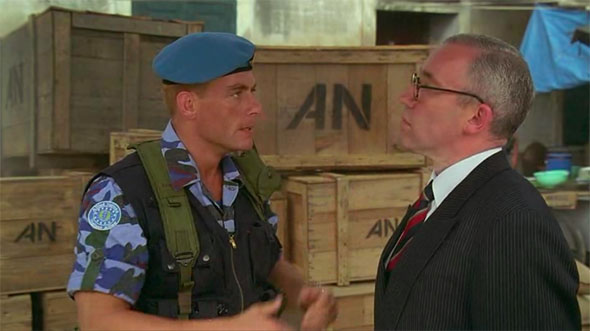
“Colonel, have you lost your mind?” The bureaucrat condescendingly asks.
His famous retort so eloquently reframes the popular discontent against the United Nations at the time:

“No. You’ve lost your balls!”
I say “reframes” because he’s not simply reiterating the same tired arguments in support of greater world contributions to peacekeeping efforts, increased funding, etc. Instead, he’s cutting to the heart of the issue: the “balls” he refers to is international resolve. The will to stand up against evil and not make politically expedient compromises with the enemy. If those things were in place, then everything else would line up behind it.
Col. Guile proceeds to ignore the orders and rally his “True purrs” for the fight against M. Bison:
But this is just juvenile fantasy, right? Well, not exactly. Although the UN had bungled its role on the international stage in the years leading up to Street Fighter, Col. Guile’s words would ring true in a series of catastrophic peacekeeping failures.
Starting in April 1994, genocide in Rwanda began to involve the Belgian (oh, the irony) contingent of UN force on the ground. Things did not go well. The troops surrendered their weapons to government troops, only to be promptly murdered by them. Remaining UN forces had no clear legal mandate for their mission and no clear rules of engagement, even in the defense of civilians. After Belgium withdrew the rest of its forces, UN member nations were slow to send reinforcements…until AFTER most of the killings had subsided.
I think I know what Col. Guile would say to this lack of international will:

“No. You’ve lost your balls!”
It is a strange coincidence that this major UN failure occurred in the months leading up to the December 1994 release of this movie. But even with Col. Guile’s admonition and the Rwanda catastrophe fresh on the minds of the international community, UN peacekeepers once again lost their balls in the July 1995 incident known as the Srebrenica Massacre. A so-called “safe haven” turned into a killing field despite the nearby presence of 400 Dutch peacekeepers. The Dutch peacekeepers were not by themselves to blame; they lacked reinforcements and, once again, clear rules of engagement for intervening, but in the end the UN took the blame. This headline says it all:

Does Guile need to say it again? I believe he does:

“No. You’ve lost your balls!”
But stronger international resolve, (i.e. ball-retention) is only one half of Street Fighter‘s message. The other half, ironically, is the glorification of American unilateralism and exceptionalism.
Take, for example, the scene where Guile rams his armored vehicle into the fighting arena and declares to the crowd, “You’re all under arrest.”
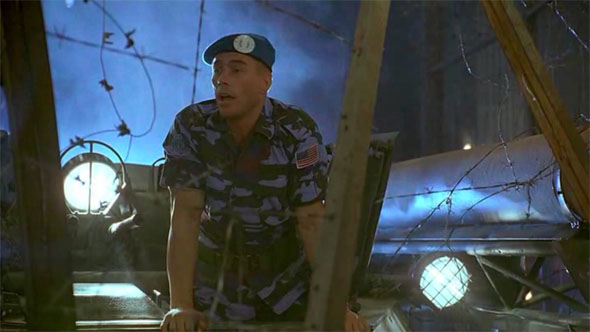 Granted, he’s operating under UN…er…AN auspices at this point in the movie, but notice the American flag on his sleeve. And notice that he’s by himself here, without any multinational troops backing him up.
Granted, he’s operating under UN…er…AN auspices at this point in the movie, but notice the American flag on his sleeve. And notice that he’s by himself here, without any multinational troops backing him up.
In the big speech, Guile may be addressing his multinational true-perrs, but he’s doing so as an American in defiance of the AN’s legal mandate. And that flag…it’s practically screaming from his left arm:
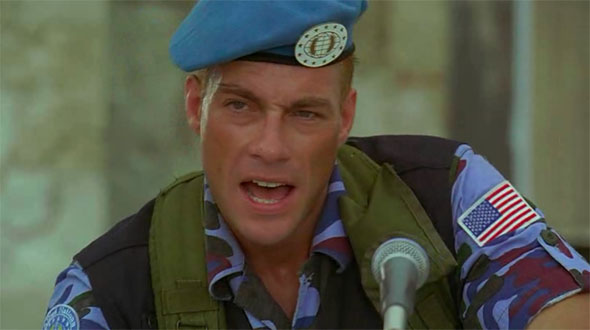
Guile never loses his American identity during this movie. Even when he takes his uniform off, the flag’s still there!
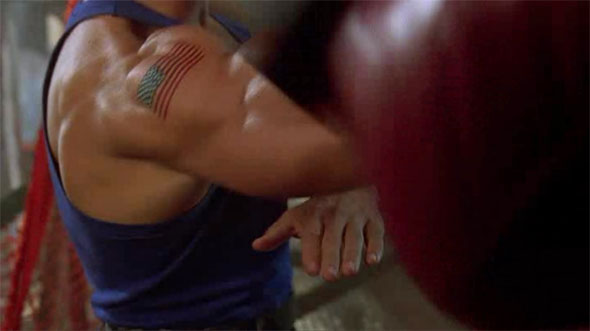
At the end of the day, it seems like a victory for international cooperation, but in reality, it was an American-led coalition acting outside of AN-auspices that took down the evil dictator.
Sounds familiar, right?
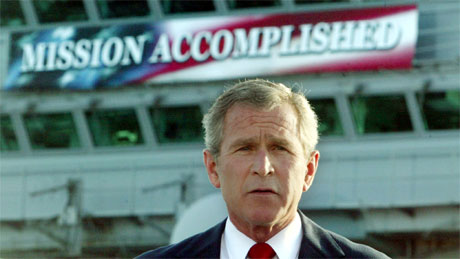
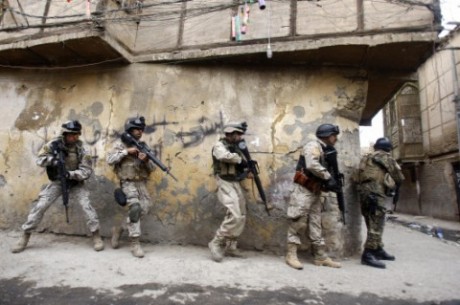
Oh, wait. That wasn’t quite as easy as taking the boat up river and kicking M. Bison’s ass.
Conclusion
I do want to clarify that I don’t mean to trivialize the failures of UN peacekeeping missions to stop the genocides of Rwanda and Bosnia in the 90’s by likening the situations to that of Street Fighter. Nor do I mean to trivialize America’s tremendous sacrifice during the Iraq War. OK, I probably am getting a little humor at the expense of ol’ W, but hey, he’s the gift that keeps on giving.
I do mean to demonstrate through some analysis of the Street Fighter movie the nature of this dilemma facing American foreign policy decision makers. Guile may be right when he laments the failure of the international community to act in a time of crisis, but sometimes it’s hard to know when it’s appropriate to act with military force. It’s not too far-fetched to imagine Guile’s mission gone awry: massive civilian casualties, a re-escalation of Shadaloo’s civil war, thousands more dead. Guile, and in turn, America, would have lost a huge amount of legitimacy. And that, in many ways, is far worse than losing your balls.
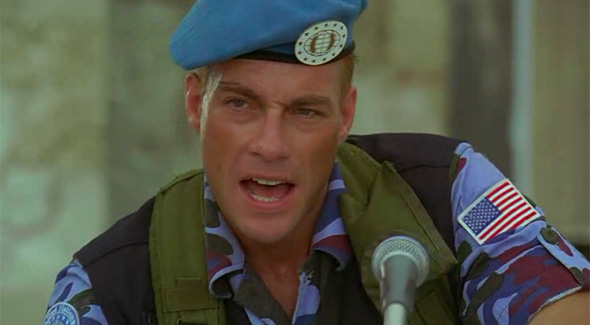
My next request: A comparison of the band M. Bison to the agenda of the character. Do their lyrics actually convey something about his innermost heart?
The kind of ironic thing about American foreign policy during the Bush administration is how America’s position on pretty much everything (not just Iraq) was, “We do what we want, eff yoo!” which took a lot of balls- but now those balls have been completely obliterated as a direct backlash to those demonstrations of machismo.
Nice piece, right up my alley.
Instead of “see also:” you should use “look at on Wikipedia,” but only on the things that human eyes should never have to see.
Also, did the UN ever actually have “balls”? When we look back to the conflict in Kuwait, we don’t really consider it a UN action. It was the “Gulf War (that America fought).” And couldn’t we also talk about this as someone’s interpretation of what Korea and Vietnam were supposed to be like?
I”m a new reader and podcast listener. I like these articles that give perspective to films and put them into context. Keep up the good work!
obviously we should be careful about reading too much into these things, but it’s interesting that zangief, the russian, sides with bison and cammy, the briton, as well as the japanese characters (ryu, honda), side with guile. other characters don’t necessarily play into the standard ideas of international relations, and it’s probable that the writers were broadly just trying to shoehorn all these ludicrous stereotypes (reminiscent of wrestling) into something like a coherent plot (in which they failed).
in the game bison was in thailand, although his name and appearance don’t exactly scream thai. anyway i guess they thought thailand would be inappropriate(?)
oh yea, and the blanka thing ties into human rights controversies (whereas the states never violates human rights, right?)- as to his being latin american, i’m going to leave that an open issue partly because i’m already reading a lot into it.
i wonder what the hell people thought of it at the time. most probably didn’t think too hard about the comparisons made in this article. did many think ‘this is a profound translation of real-world issues into fiction’? i hope not.
@inmate
Korea was very much a UN action. On the other hand, while Nixon and LBJ were very keen to get coalition partners in Vietnam, their potential targes would have none of THAT.
So I’ve always wondered whether, in Street Fighter 2 the video game, Guile’s jackknife also creates a sonic boom with his legs. The animation kind of looks like it does, but maybe that’s light being blurred by incredibly fast kicking action.
Movie was BS. Why did they make Balrog a cameraman? A CAMERAMAN FFS!